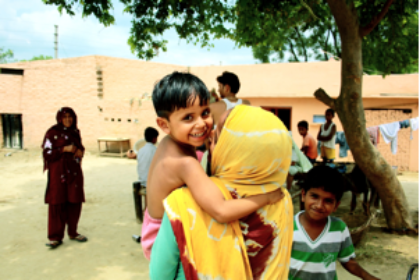
Experts at UCSF and UC Berkeley are teaming up to evaluate an m-health intervention designed to improve healthcare and nutrition for mothers and babies in India, with a 2-year, $1.5 million grant from the Bill & Melinda Gates Foundation.
Maternal child health interventions in India have improved significantly in recent years, with much credit given to the Integrated Child Development Scheme (ICDS), a system initiated by the Government of India in 1975 to improve the health and wellbeing of mothers and children under 6. For this population, ICDS provides health and nutrition education, health services, supplementary food, and pre-school education–provided with the support of a large network of Anganwadi Centres and Anganwadi workers, helpers and supervisors.
In recent years, progress in technology such as mobile health apps and other digital innovations has led to an expansion of health care worker services and training through mobile phones and cloud technology. Despite these improvements, maternal, newborn and child malnutrition are still a major public health challenge in India. The challenge of scaling up health services and monitoring the quality of services and training remains.
One major research gap that still exists for the implementation of MCH nutrition programs in developing countries is how monitoring and information technologies truly affect community health worker behavior, efficiency and effectiveness, and how these technologies ultimately impact health outcomes in the community. This study aims to answer this question.
UCSF and UCB researchers will work in Madhya Pradesh and Bihar, India to conduct an impact, process and economic evaluation of the Common Application System (CAS) m-health intervention. CAS is a mobile phone job aid/tool for Anganwadi Workers (AWWs), to enable the automation across a variety of area areas related to service delivery; for example, the timeliness and quality of services, real-time information, and alerts. The UCSF-UCB evaluation team will generate evidence and provide feedback for the implementation and scale-up of the program. The study will include stakeholder interviews, household and worker surveys as well as qualitative interviews to assess the impact of the intervention on a range of outcomes. The team will also conduct a process and economic evaluation of the roll-out of the system as well.
The goal of the CAS intervention is to ultimately strengthen implementation of the ICDS across India. However the grant also presents an opportunity to bring together the transdisciplinary and complementary expertise in maternal and child health, nutrition, and adolescence represented by UCB and UCSF faculty. Dr. Lauren H. Goldstein, Director of Research Development at the UC Berkeley School of Public Health, said of the partnership, “This research evaluation project is exciting because of the breadth of expertise we have brought together from UCSF and UCB including leaders in maternal, newborn and child health, development and nutrition, obstetrics, data informatics, and quantitative, economic and process evaluation.”
The potential to bring together transdisciplinary efforts for maternal, newborn and child health, nutrition, and adolescence is great in the Bay Area, given the overlapping research expertise of UCB and UCSF faculty. Both schools boast research centers and initiatives focusing on an impressive ecosystem of transdisciplinary clinical, social, population, and policy factors impacting vulnerable maternal, neonatal, child and adolescent health around the world.
The principal investigator for the grant at UCSF is Dr. Dilys Walker, a professor of obstetrics and gynecology who leads the Global Maternal and Newborn Health Research Cooperative at UCSF Global Health Sciences and brings a long history of research and service delivery in maternal health in Latin America, Africa and India. She will work closely with Dr. Lia Fernald, Professor and Co-PI at the UC Berkeley School of Public Health (Community Health Sciences Division). Fernald has conducted research around the world examining the effects of community mobilization; conditional cash transfer programs, microcredit programs, and community-based nutrition supplementation on infant and child development.
